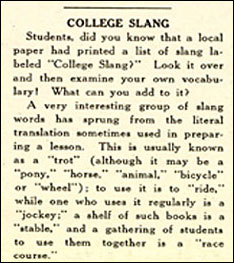 Have you ever wondered where some of the phrases you use every day come from? Probably not, since you use them every day. But I’m here to tell you that some of those very phrases and slang words have been around since the 1910s! Either that or they came back from the dead, like skinny jeans and platform shoes.
Have you ever wondered where some of the phrases you use every day come from? Probably not, since you use them every day. But I’m here to tell you that some of those very phrases and slang words have been around since the 1910s! Either that or they came back from the dead, like skinny jeans and platform shoes.
See, I found an old article from the January 8, 1919 edition of the Trail that was titled “College Slang,” and old slang is one of my favorite things to find (and use). So, if you ever find yourself in need of some strange new words to add to your vernacular, take a look at these, and see if any manage to trip your trigger.
A textbook was known as anything from a “trot” to a “pony” to a “bicycle.” If you’re studying a textbook, you’re going for a “ride.” If you study a lot, you’re a “jockey.” If you have a lot of textbooks on a shelf, you can call it a “stable,” and if you have a bunch of study buddies, you can say you’re all going to the “racecourse.” Then you can confuse people because they might think you’re going to the Tacoma Speedway in the rain and for no particular reason when really, you’re just going to study.
If you get a perfect score on a test, it’s a “ten strike.” On the other hand, if you get a zero (which I hope no one does), it’s a “zip” or a “bust.” If you do just well enough to pass, then you “slide through,” which is still a pretty common phrase. If you’re preparing for a test, then you’re “loading” for it. A class failure is a “flunk,” which I’m sure you’ve never heard before, and “bull” is usually (and I quote): “to recite when unprepared, usually stupidly, and at length.”
If you ever need a new word to call your female classmates, you could call them “hens” or “quail,” or even “calico.” If you’re escorting a particular lady friend back to her room, you could say you’re “taking calic to the hen coop.” Granted, that was a term used when there was a specific women’s dormitory, but I suppose you could still adapt it to today.
So remember, if you ever find yourself “cutting” a class…there were students nearly 100 years ago who were doing the exact same thing, with the exact same word, too.
By Morgan Ford
